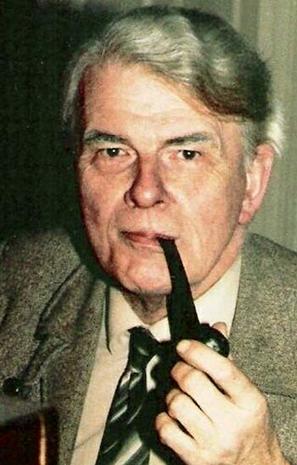Philip Marshall - Part II
|
Philip Marshall's war service (1939-46) deprived him of the chance of being taught directly by the legendary Edward Bairstow who died in the year of Philip's return to civilian life. Bairstow (b.1874) exercised great influence on musical education for over 40 years as Organist and Master of the Choristers at York Minster. He was also Professor of Music at Durham University – a combination of posts that would be impossible to-day.
Bairstow had a formidable reputation as a teacher – of singing, of organ-playing and of music theory, all then essential to aspiring organists. His pupils, and their pupils in turn, formed a school that produced outstanding results, preparing people for Royal College of Organists diplomas and for the demanding Durham degrees of B.Mus and D.Mus. Among those who took this path were Francis Jackson, Bairstow's successor at York, Gordon Slater, Marshall's predecessor at Lincoln, Arthur Wills (Ely), Dennis Townhill (Edinburgh), Philip himself . . . the list could go on for a long time. |
Philip came under the influence of two of Bairstow's pupils, Whiteley Singleton – for ARCO and FRCO – and Francis Jackson for D.Mus. He came equally strongly under the influence of a third - Ernest Bradbury*, for many years the influential music correspondent of The Yorkshire Post and uncle of Margaret, who married Philip in 1951.
|
Bairstow and Marshall had a great deal in common. Those who knew them professionally commented on their encyclopaedic knowledge of music, their flowing lines in composition and their great ability as teachers. Anthony Gowing, formerly of Gloucester Cathedral, remembers with some awe Philip's fluency in harmony and counterpoint and his ability to communicate his understanding of these sometimes difficult subjects.
|
“Seemliness” is an old-fashioned word but it sums up the compositions and performance of both. Church music had to be dignified – but by no means dull; suitable words should reflect high thought – and not the trivial. These were the standards especially upheld by many church composers in the first half of the 20th century. Philip maintained them to the end.
Edward Bairstow and Philip Marshall were both accomplished speakers. Philip could weave words, when presenting fact and opinion, as he could melodies. He was always prepared to defend his own views robustly. Again like Bairstow, he was known for his bluntness of expression. A happy memory for many is that of Philip publicly destroying the arguments of a senior and opinionated "hierarch" who was pressing for the adoption by Lincoln Cathedral choir of a work by a friend of his. At length, the exasperated parson asked "But don't you find that the words and music complement each other most happily? Philip paused, and as if about to give ground, said, "Well, yes." Then drawing himself up to his (considerable) full height, he boomed, "But only because only such dreadful doggerel deserves to be coupled with such frightful noise".
Edward Bairstow and Philip Marshall were both accomplished speakers. Philip could weave words, when presenting fact and opinion, as he could melodies. He was always prepared to defend his own views robustly. Again like Bairstow, he was known for his bluntness of expression. A happy memory for many is that of Philip publicly destroying the arguments of a senior and opinionated "hierarch" who was pressing for the adoption by Lincoln Cathedral choir of a work by a friend of his. At length, the exasperated parson asked "But don't you find that the words and music complement each other most happily? Philip paused, and as if about to give ground, said, "Well, yes." Then drawing himself up to his (considerable) full height, he boomed, "But only because only such dreadful doggerel deserves to be coupled with such frightful noise".
He was also the master of striking and unexpected imagery.
Anthony Gowing: He once described one of his Lay-Clerks in the Choir at Lincoln (I can’t remember which one) as having a 'Voice like vomit'. Sorry, Dr. Marshall? says I – “VOMIT!” was the response!
It is not hard to imagine the effect that thoughts like these, forcibly expressed, as they sometimes were in a crowded bar, had on other patrons. This one certainly left no one in any doubt about the quality – or lack of it – of the offending singer's voice.
The many stories of forthrightness taken alone give only an unbalanced picture. Many musicians, from retired organists of note to junior scholars, have paid tribute to the great kindness they received from both Philip and Margaret – a kindness, as one said, that was not fully appreciated at the time.
Philip's inventiveness as a composer was demonstrated in his “upsidedowny” tunes, some of which featured in Christmas cards sent by the Marshalls. One, from 1967, a musical palindrome, is reproduced here with its words. This has not been printed twice in error – the second version really is the first turned upside down – as standing on your head, if in doubt, will demonstrate. (or better still, click on the links to view the complete music from beginning to end - and back again.)
Anthony Gowing: He once described one of his Lay-Clerks in the Choir at Lincoln (I can’t remember which one) as having a 'Voice like vomit'. Sorry, Dr. Marshall? says I – “VOMIT!” was the response!
It is not hard to imagine the effect that thoughts like these, forcibly expressed, as they sometimes were in a crowded bar, had on other patrons. This one certainly left no one in any doubt about the quality – or lack of it – of the offending singer's voice.
The many stories of forthrightness taken alone give only an unbalanced picture. Many musicians, from retired organists of note to junior scholars, have paid tribute to the great kindness they received from both Philip and Margaret – a kindness, as one said, that was not fully appreciated at the time.
Philip's inventiveness as a composer was demonstrated in his “upsidedowny” tunes, some of which featured in Christmas cards sent by the Marshalls. One, from 1967, a musical palindrome, is reproduced here with its words. This has not been printed twice in error – the second version really is the first turned upside down – as standing on your head, if in doubt, will demonstrate. (or better still, click on the links to view the complete music from beginning to end - and back again.)
Click on the image above to view a 2500px wide version ( 107kb) Printing out the largest image file (2500px) will show the palindromic nature of the PM's Brawle
David Bridgeman-Sutton, February 2010
(The Philip Marshall 'Brawle' is copyright to the Estate of the late Dr Marshall)
* FOOTNOTES: Ernest Bradbury's opposite number across the Pennines was Neville Cardus, who combined musical criticism with cricket writing on the Manchester Guardian.
Comment from Michael Whitehall about Palindromes in general: "Your mention of palindromes reminded me of what I imagine is the ultimate specimen: 'Doc, note I dissent. A fast never prevents a fatness. I diet on cod.' Although attributed incorrectly to various authors the originator was Peter Hilton, a mathematician who worked code-breaking with the Enigma machines at Bletchley Park during WW II prior to a distinguished university career."
Comment from Michael Whitehall about Palindromes in general: "Your mention of palindromes reminded me of what I imagine is the ultimate specimen: 'Doc, note I dissent. A fast never prevents a fatness. I diet on cod.' Although attributed incorrectly to various authors the originator was Peter Hilton, a mathematician who worked code-breaking with the Enigma machines at Bletchley Park during WW II prior to a distinguished university career."




